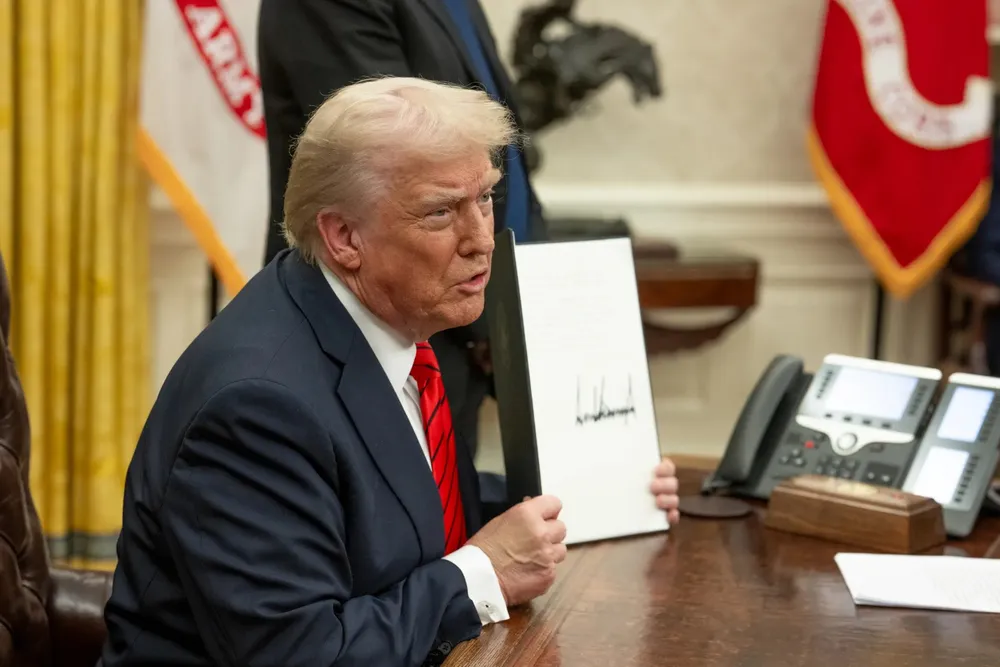Court battle over Trump tariffs unlikely to signal relief for clean energy, analysts warn
Analysts highlight that the President has multiple tools at his disposal to keep trade tensions high and potentially raise costs for import-reliant renewables

A flurry of court rulings that first reversed then maintained President Donald Trump's tariffs is unlikely to signal any early respite for the US clean energy sector over the issue, analysts said.
White House lawyers had by the end of Thursday successfully applied for a court order freezing pending appeal an earlier ruling by the Court of International Trade’s (CIT) that most of the tariffs were imposed illegally and should be lifted.
The tariffs will now stay while the appeal process plays out, but analysts said the White House has a wide range of powers at its disposal, while tariffs on steel and aluminum that are key inputs for clean energy industries are not covered by the CIT's ruling.
The US heavily sources battery and solar components and processed materials, and commercial electrical equipment from countries that are especially targeted by Trump for their large bilateral trade surpluses with the US.
These include Cambodia, China, India, Japan, Malaysia, Mexico, South Korea, Thailand, and Vietnam.
Onshore wind is less exposed but still imports $2-$3.5bn in most years of blades, hubs, generating sets including nacelles and towers. A big supplier is the European Union, which has the second largest trade surplus with the US after China.
Offshore wind, a nascent industry here, is almost entirely dependent on equipment and installation vessels from the EU.
The Department of Justice on Thursday quickly and successfully filed an emergency motion with the US Court of Appeals for the Federal Circuit asking it to freeze the Court of International Trade’s (CIT) ruling while it prepares an appeal.
A three-judge trade court panel had ruled that Trump overstepped his executive authority by invoking a 1977 law – International Emergency Economic Powers Act – to impose tariffs at their highest levels since 1938 under his “Liberation Day” trade policy.
They include a 10% baseline levy on goods from all countries, four times the average effective tariff rate in effect before he took office in January, and so-called reciprocal tariffs on more than 60 countries as high as 50% that Trump paused last month for 90 days.
The court also ruled Trump exceeded his executive authority by imposing separate tariffs of 25% on most goods from Canada and Mexico, and 20% on all goods from China, as punishment for their alleged failure to slow illegal immigration and cartel-related flow of the opioid fentanyl into the US.
The ruling gives the administration 10 days to stop collection of those tariffs.
“This ruling represents a setback for the administration's tariff plans and increases uncertainty but might not change the final outcome for most major US trading partners," said Jan Hatzius, chief economist at Goldman Sachs, in a note to clients.
“As it seems unlikely that the administration could win an appeal in the 10 days it has under the CIT order to remove the tariffs, we would expect the White House to announce a similar across-the-board tariff using Sec. 122,” he added, referring to the Trade Act of 1974, which allows tariffs up to 15% for 150 days on nations deemed to have excessive trade surpluses with the US.
Not affected by the court’s decision is a 25% tariff on all imports of aluminum and steel, including derivative products that are key inputs for the clean energy industry.
Derivative products are those made from aluminum and steel that have undergone further manufacturing or processing.
(Copyright)